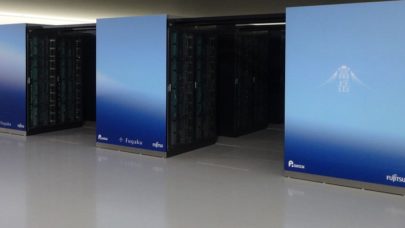
Fujitsu Study Says Quantum Decryption Threat Still Distant
January 23, 2023
Global computer and chip manufacturer Fujitsu today reported that a new study performed on its 39-qubit quantum simulator suggests it will remain difficult for Read more…

Fujitsu to Supply CESGA with Quantum Computer
January 7, 2023
The Galician Supercomputing Center (CESGA) – located in northwestern Spain – has announced that it will acquire a quantum computer, valued at €14 million Read more…

Raja Koduri and Satoshi Matsuoka Discuss the Future of HPC at SC21
November 29, 2021
HPCwire's Managing Editor sits down with Intel's Raja Koduri and Riken's Satoshi Matsuoka in St. Louis for an off-the-cuff conversation about their SC21 experience, what comes after exascale and why they are collaborating. Koduri, senior vice president and general manager of Intel's accelerated computing systems and graphics (AXG) group, leads the team... Read more…

Fugaku to Delve Into the Molecular Mechanisms of COVID Inhibition
June 23, 2021
Over the last year, Riken’s Fugaku supercomputer (pictured in the header) has maintained the top spot on the Top500 thanks to a staggering 442 Linpack petaflo Read more…

EuroHPC Lays Out a Roadmap for (Almost) All of Its New Systems
March 24, 2021
In 2021, Europe is aiming to break the Top500. Nearly two years ago, EuroHPC – the Joint Undertaking (JU) that serves as the European Union’s coordinated su Read more…

What’s New in HPC Research: Galaxies, Fugaku, Electron Microscopes & More
January 25, 2021
In this regular feature, HPCwire highlights newly published research in the high-performance computing community and related domains. From parallel programmin Read more…

Top500: Fugaku Keeps Crown, Nvidia’s Selene Climbs to #5
November 16, 2020
With the publication of the 56th Top500 list today from SC20's virtual proceedings, Japan's Fugaku supercomputer – now fully deployed – notches another win, Read more…

Riken’s Dr. Yutaka Ishikawa Tells the Fugaku Development Story
October 12, 2020
Fielding a leadership-class supercomputer doesn't happen overnight or even in the span of a year; rather it is a multi-year undertaking. Development of the reco Read more…

- Click Here for More Headlines

Whitepaper
Transforming Industrial and Automotive Manufacturing
In this era, expansion in digital infrastructure capacity is inevitable. Parallel to this, climate change consciousness is also rising, making sustainability a mandatory part of the organization’s functioning. As computing workloads such as AI and HPC continue to surge, so does the energy consumption, posing environmental woes. IT departments within organizations have a crucial role in combating this challenge. They can significantly drive sustainable practices by influencing newer technologies and process adoption that aid in mitigating the effects of climate change.
While buying more sustainable IT solutions is an option, partnering with IT solutions providers, such and Lenovo and Intel, who are committed to sustainability and aiding customers in executing sustainability strategies is likely to be more impactful.
Learn how Lenovo and Intel, through their partnership, are strongly positioned to address this need with their innovations driving energy efficiency and environmental stewardship.
Download Now
Sponsored by Lenovo
Whitepaper
How Direct Liquid Cooling Improves Data Center Energy Efficiency
Data centers are experiencing increasing power consumption, space constraints and cooling demands due to the unprecedented computing power required by today’s chips and servers. HVAC cooling systems consume approximately 40% of a data center’s electricity. These systems traditionally use air conditioning, air handling and fans to cool the data center facility and IT equipment, ultimately resulting in high energy consumption and high carbon emissions. Data centers are moving to direct liquid cooled (DLC) systems to improve cooling efficiency thus lowering their PUE, operating expenses (OPEX) and carbon footprint.
This paper describes how CoolIT Systems (CoolIT) meets the need for improved energy efficiency in data centers and includes case studies that show how CoolIT’s DLC solutions improve energy efficiency, increase rack density, lower OPEX, and enable sustainability programs. CoolIT is the global market and innovation leader in scalable DLC solutions for the world’s most demanding computing environments. CoolIT’s end-to-end solutions meet the rising demand in cooling and the rising demand for energy efficiency.
Download Now
Sponsored by CoolIT
Advanced Scale Career Development & Workforce Enhancement Center
Featured Advanced Scale Jobs:
HPCwire Resource Library
HPCwire Product Showcase
© 2024 HPCwire. All Rights Reserved. A Tabor Communications Publication
HPCwire is a registered trademark of Tabor Communications, Inc. Use of this site is governed by our Terms of Use and Privacy Policy.
Reproduction in whole or in part in any form or medium without express written permission of Tabor Communications, Inc. is prohibited.
























